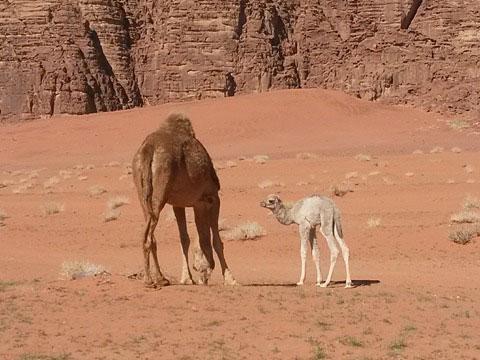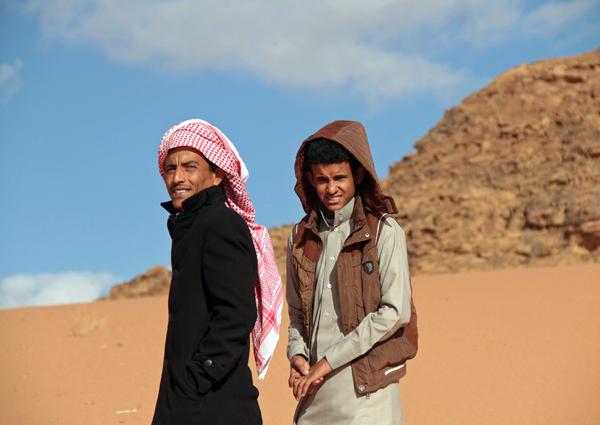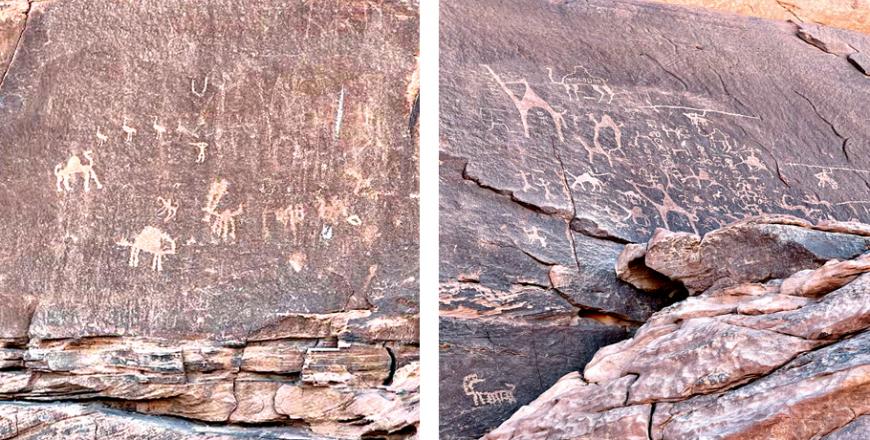You are here
Untold bedouin traditions still alive in Wadi Rum
By Ahmed Bani Mustafa - Oct 02,2017 - Last updated at Oct 02,2017

The bedouin way of life is closely connected to the desert and its creatures, and their livelihood depends on camels and sheep (Photo by Ahmed Bani Mustafa)
AMMAN — Insulated in the desert wilderness of southern Jordan, bedouins of Wadi Rum, 330km south of Amman, still preserve customs and traditions that benefit their harsh habitat.
The bedouin way of life is closely connected to the desert and its creatures, and their livelihood depends on camels and sheep.
When a baby is born, the father hunts for a scorpion, then burns and crushes it, mixes it with olive oil, and applies it to the child's body out of the belief that the treatment would protect the infant from scorpions during his life.
"Almost every baby in Wadi Rum receives this formula and it really protects them from scorpion stings", Abu Ryad, a Wadi Rum resident told The Jordan Times on Monday.
"I saw it many times when someone was stung by a scorpion and felt little to no pain,",Abu Ryad said.
Mikhlid Zawaydah, a resident of Disi, confirmed the ritual, adding that they also gave babies daily portions of saliva of a previously vaccinated person.
Veterinarian Suzana Anati said that "the practice is possible, since applying small portions of venom would develop antibodies against stings and improve immunity".
"Some communities across the world give their children small portions of poison to develop their immunity against it," added Anati.
If a she-camel became barren, a bedouin herder could operate a "safe surgery" by taking her womb out and treating possible cuts with desert ants, explained Zeid Jwayan, a Wadi Rum resident
"He took the womb outside, checked for cuts and closed them by using ants," Jwayan said.
"The ant clings to the skin and the herder tears away its head, which stays on until it dissolves naturally," Jwayan added.
Since the calf-bearing period is quite long and each pregnancy results in the expansion and cracking of the womb, cuts need to be closed, veterinarian Anati explained.
Nowadays, veterinarians do the same operation to close the cuts but, they are using surgical stitches, Anati added.
The camel's womb is "too flexible" and stretches to larger sizes, with repetitive pregnancies it gets cracked, which requires surgery, according to the veterinarian.
When it comes to the culinary delights of the desert, the wadi is well-known for a meal that is cooked underground called "Zarb", which is similar to the New Zealander meal "hungi".
"Zarb is a centuries-old method of cooking, where the bedouins place food on coal and cover it for two to three hours," according to Abu Ryad.
Bedouins pride themselves on virtues such as bravery, generosity and hospitality, according to the local.
The well-known hospitality is incomplete without the presence of coffee. Coffee is more than a mere drink for bedouins, Abu Ryad said, explaining that every household must have coffee as it is a testimony that the host is always ready to receive guests.
According to bedouin traditions, the host does not inquire about the guest's personal information or the reason behind the visit for the first three days as it was considered rude.
The traditions also extend to the domain of law and order. The bedouins had a tribal judicial system, said Abu Ryad, adding that a respected judge existed in every region and people referred their cases to him and held trials.
During the hearing, the judge used a skilled individual called a "mubashe", who used a long spoon for roasting coffee to identify who was telling the truth.
"The mubashee heated up the spoon and dabbed it quickly on the defendant's tongue, the tongue of the one who lied would have been obviously more affected than the honest one, as the liar's tongue would be drier", Abu Ryad claimed.
Every Bedouin tribe has a sheikh, who is responsible for looking after his people, solving issues, hosting guests, and making decisions on migration.
The sheikh's tent has to be the largest, located at the highest peak of the area, and the sound of "mihbash" (coffee mortar) must be heard by the tribe every morning as a sign of enthusiasm to host guests, Jwayan explained.
If people do not hear the sound, it means the sheikh is not available, according to Jwayan.
A bedouin tent is distinctive by its black colour with white stripes, said the local, adding that they used goat hair and camel lint that provided a good shelter even during rainfall.
A medium-sized tent required two years to be woven, usually by the woman, said the Jwayan.
Wadi Rum is part of “the Golden Triangle” of tourist attractions in Jordan, along with Aqaba and Petra. The protected area is also one of UNESCO’s four World Heritage Sites in the Kingdom.
The desert valley was mentioned in Greek and Roman ancient history accounts, and was described by Lawrence of Arabia as “vast, echoing and godlike”.
It has provided the location for several Hollywood films, including “Lawrence of Arabia” and “The Martian”.
Related Articles
AMMAN — Bedouins from Lebanon, Syria, Jordan and the Occupied Palestinian Territories will gather in Wadi Rum on October 19 with the aim of
SHAKRIYEH, Southern Badia — For the amateur cast of acclaimed Jordanian film "Theeb" from a bedouin clan and for two young Jordanians writin
AMMAN — The 12,000 years of human occupation in the Arabian Peninsula are illustrated through the diverse markings left by various civilisat













